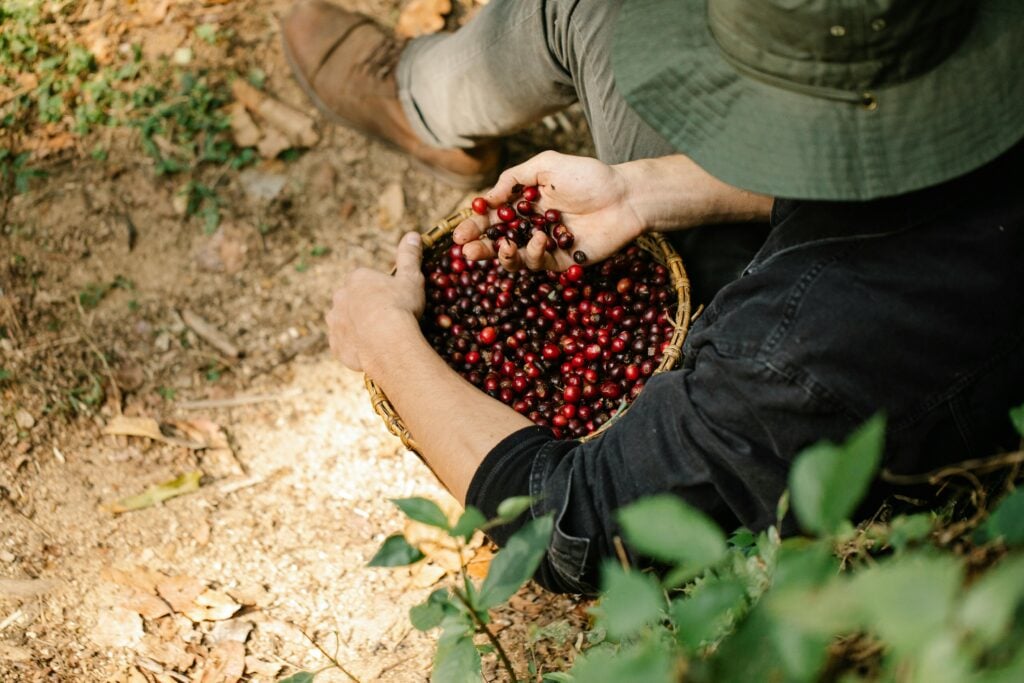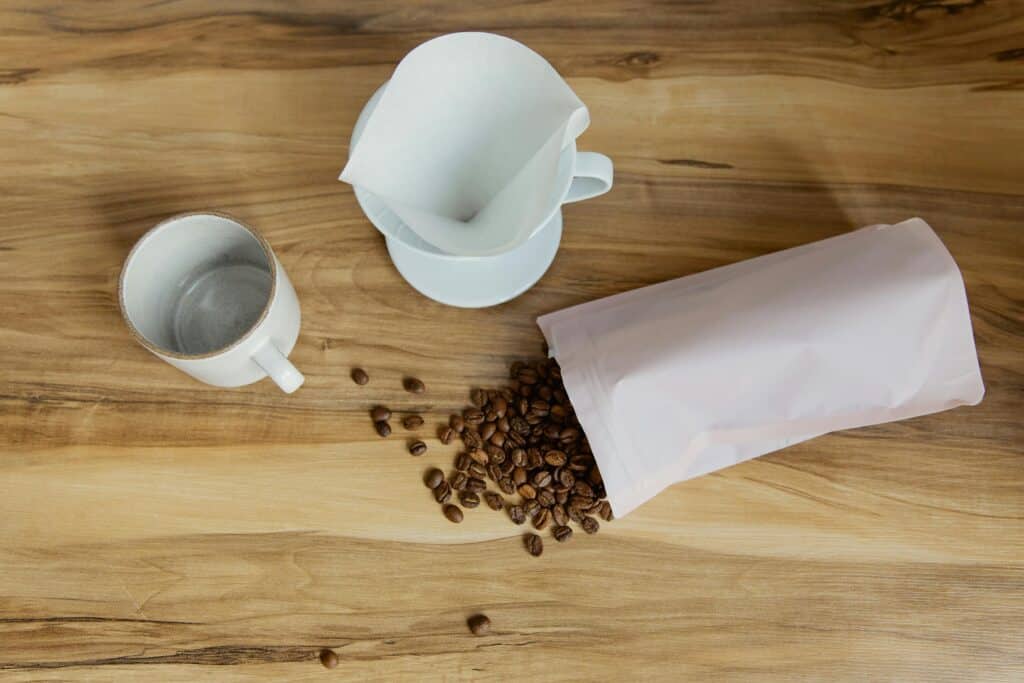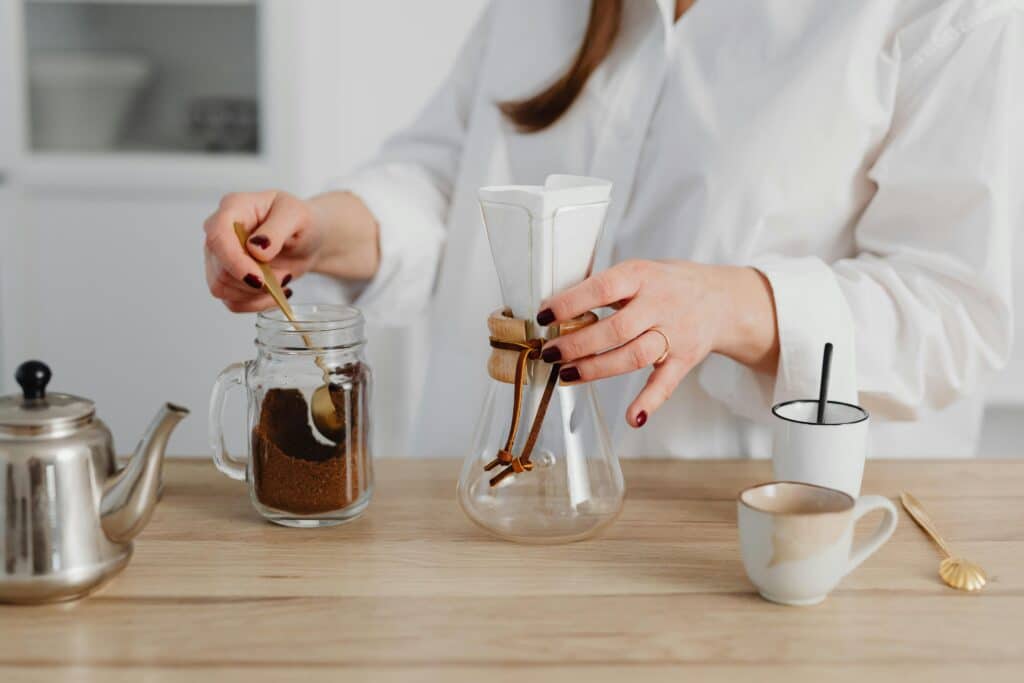Coffee Storage Do’s And Don’ts

Are you keeping your coffee beans stored properly to keep them fresh and healthy? Most people are unknowingly making mistakes when it comes to storing their coffee beans. This can lead to the coffee losing its freshness and result in the loss of valuable antioxidants.
Coffee is one of the richest sources of antioxidants in the average person’s diet. But in order to get the most health benefits from your morning brew, it’s important to store your beans properly.
In this article, we’ll talk about the science behind coffee storage and uncover the best methods to keep your beans fresh. You’ll learn:
- What causes coffee to lose freshness
- Best conditions for coffee beans storage
- Keeping antiofxidants with proper storage
- Choosing the right coffee packaging
- Serving sizes for fresher coffee
By the end, you’ll have practical tips to enjoy the fullest flavor and health advantages from every bag of your favorite coffee beans. Let’s get started!

The Enemies of Fresh Coffee
To understand how to store coffee the right way, we first need to look at the main factors that lead to its loss of freshness:
Oxygen exposure: Coffee beans start to oxidize and go stale as soon as they are exposed to air. The aromatic compounds and oils that give coffee its delicious flavor and aroma break down when they come into contact with oxygen.
Moisture and humidity: Too much moisture harms coffee beans, making them swell and lose flavor. In humid places, beans can also develop mold and off-flavors.
Light and heat: Direct sunlight and heat accelerate the staling process by speeding up oxidation. Light can also change the color of the beans and cause unpleasant flavors to develop.
Why Oxygen is Coffee’s Worst Enemy
Oxygen is by far the biggest threat to coffee freshness. The flavor and aroma of roasted beans start to fade as soon as they come into contact with air.
The fragrant elements in coffee are sensitive and likely to break down when exposed to oxygen. These include aldehydes, ketones, and sulfur compounds that give coffee its complex bouquet.
Over time, oxidation makes coffee oils go rancid, resulting in flat, cardboard-like flavors. The longer beans are exposed to oxygen, the worse their quality gets. In fact, coffee reaches its peak flavor just a few days after roasting and can start to go downhill in as little as a week if not stored properly.

The Role of CO2 in Coffee Freshness
Another factor in coffee freshness is the release of carbon dioxide (CO2) after roasting. During the roasting process, CO2 builds up inside the beans. After roasting, the beans slowly release this CO2 over time.
The presence of CO2 signals ongoing degassing in the beans, indicating freshness. However, excessive CO2 levels can pose potential issues.
If coffee is packaged or stored in a completely airtight container immediately after roasting, the CO2 buildup can cause the package to expand and even burst. That’s why freshly roasted beans need a way to release CO2 without letting oxygen in. Many coffee bags have one-way valves that allow CO2 to escape while preventing oxygen from entering. When storing coffee at home, it’s important to use a container with a valve or to open the lid briefly every few days to release built-up gas.
Typically, it’s suggested to allow freshly roasted beans to degas for several days before storing them in an airtight container. This lets the CO2 out slowly, stopping too much pressure from building up.

The Myth of Freezing Coffee Grounds
While oxygen is coffee’s primary enemy, moisture is a close second. Exposure to moisture can cause a lot of issues for coffee beans, such as:
- Flavor loss due to water-soluble compounds dissolving
- Swelling and softening of the beans, increasing susceptibility to oxidation
- Growth of mold and bacteria
- Absorption of undesirable flavors and aromas from the surroundings
Ideally, coffee beans should be stored in a low-humidity environment away from any sources of moisture. The optimal relative humidity range for coffee storage is between 50-60%. If you live in a particularly humid climate, it may be worth investing in a humidity-controlled storage container or a small dehumidifier for your pantry.
It’s also important to avoid any sudden changes in humidity, as this can cause condensation. That’s why storing coffee in the fridge or freezer is generally not recommended.
Light and Heat Exposure
Apart from oxygen and moisture, exposing your beans to light and heat can also break them down over time, but rather quickly.
Light, especially direct sunlight, can cause photo-oxidation in coffee beans. Exposure to light can also bleach the beans, causing them to lose their rich color. Clear or light-colored containers let in more light, so it’s best to store coffee in dark-colored containers.
Heat is another factor that speeds up staling. Warmer temperatures cause the aromatic compounds in coffee to volatilize and dissipate quicker.
Ideally, coffee should be stored at room temperature or slightly below, around 20°C/68°F. Avoid storing beans near heat sources like ovens, stoves, windows, or in cabinets above refrigerators. Consistency in temperature is also important. Frequent roller coasters from hot to cold can cause condensation to form on the beans, leading to moisture damage.

The Ideal Coffee Storage Environment
Here are the best ways to store your beans to keep them fresh:
Airtight, opaque containers: The best way to protect coffee from oxygen, light, and moisture is to store it in airtight containers that block out light. Ceramic or non-reactive metal containers with tight lids work well. Avoid clear glass or plastic containers.
Some good storage container options include:
- Airscape canisters: These have an inner lid that pushes out air as you press it down, sealing it tight. They also come in opaque colors.
- Fellow Atmos canisters: These vacuum canisters have a built-in pump that removes air from the container before sealing. They’re made of opaque borosilicate glass and stainless steel.
- Miir Airscape canisters: Similar to the original Airscape, these have a sleek stainless steel design with a fresh coffee friendly lid.
Cool, dark, dry place: Keep your coffee canisters in a cool, dark cupboard or pantry away from direct sunlight and heat sources like ovens and windows. Aim for a stable temperature around 20°C/68°F and low humidity.
No refrigerators or freezers: While it may seem like refrigerating or freezing coffee will keep it fresh longer, the opposite is actually true. The fluctuating temperatures and moisture in fridges and freezers can cause condensation on the beans, making them deteriorate faster. The porous nature of coffee also means it can absorb odors from other foods. Never freeze your coffee beans!

Coffee Packaging Matters
High-quality, freshness-preserving packaging is the first line of defense against coffee’s enemies. Here’s what to look for when buying beans:
Airtight, opaque bags with one-way valves: The best coffee bags have one-way valves that allow CO2 to escape without letting oxygen in.
Nitrogen flushed: Some coffee roasters flush bags with nitrogen before sealing them. This displaces oxygen to keep the beans fresh until the bag is opened.
Avoid bulk bins: Coffee sold in bulk bins at grocery stores has a much higher chance of being stale and moldy since it’s exposed to oxygen, light, and moisture. If you do buy from bulk bins, only purchase what you can use within a few days. But really, just don’t buy coffee in bulk.
Check the roast date: Freshly roasted coffee is essential for the best flavor and most antioxidants. Look for bags with a roast date rather than a “best by” date.
Keep in Mind
Many people unintentionally make mistakes when storing their beans, leading to a loss of freshness. Coffee is a rich source of antioxidants and to maximize its health benefits and flavor, it’s essential to store it correctly.
Remember, oxygen, moisture, light, and heat are the main enemies of fresh coffee. Oxygen, in particular, accelerates the deterioration process, while moisture can lead to mold growth and flavor loss. Light and heat can also degrade coffee beans over time, causing them to lose their aroma and flavor.
Looking for coffee with the right packaging and freshness? Check out Purity Coffee and get yours with the code “HEALTHYHOMES20” to enjoy 20% off. With our commitment to quality and freshness, you can trust Purity Coffee to deliver the perfect cup every time.
Miriam Gubovicova
Author at Healthy Holistic Homes. Expert in sustainable living and non-toxic household solutions.